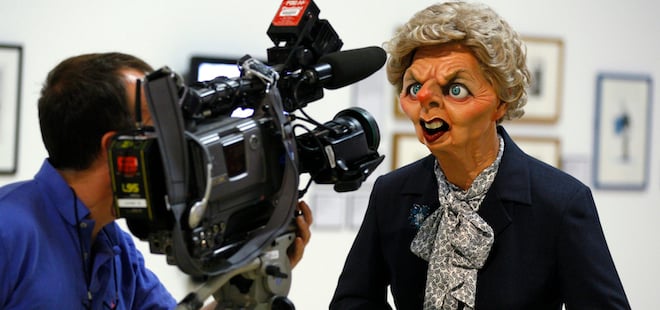How Margaret Thatcher accidentally revived British cinema
Jaime J. Weinman on the art created in the wake of Thatcherism
A camera man films a Splitting Image’s puppet of Margaret Thatcher on display in an exhibition ‘Rude Britannia : British Comic Art’ at Tate Britain in London, Monday, June 7, 2010. The exhibition explores British comic art from the 1600’s to the present day and celebrates a rich history of cartooning and visual jokes.(AP Photo/Sang Tan)
Share

Margaret Thatcher was not a great fan of the arts community, as you’d expect from someone who famously said there is “no such thing as society.” The arts responded with perhaps the greatest show of hostility of the modern era. The U.K.’s music industry seemed to be built on a foundation of anti-Thatcher songs like Crass’s How Does It Feel (to be the mother of a thousand dead)?
When U.K. theatre wasn’t corrupting the world’s taste with Cats, it was railing against Thatcher, her arts cuts, and her influence on British culture: one of the most successful playwrights of the period, Caryl Churchill, had a character berate a Thatcher supporter in her play Top Girls: “I suppose you’d have liked Hitler if he was a woman. Ms Hitler. Got a lot done, Hitlerina.” On television, Thatcher was a regular target, including the famous puppet Prime Minister on the comedy Spitting Image. Some of the most anti-Thatcher material on the small screen came from a new public TV station, channel 4, that started up during her administration.
But it was in film that Thatcher may have had the most impact—and, ironically, where she may have had a positive influence on the work of the people who felt most negatively toward her. Before Thatcher came to power, British cinema was in trouble, hit hard by economic pressures and producing few new notable filmmakers or stars of its own. The ’80s turned that around, producing a so-called “British Renaissance” of small-budget, darkly humourous films by interesting new directors like Stephen Frears (My Beautiful Laundrette), Mike Leigh (Naked) and David Leland (Wish You Were Here). And what most of these films had in common was a ferocious opposition to Thatcher.
Some of these films were explicit in their anti-Thatcher stance; Frears’ My Beautiful Laundrette became a sensation for attacking Thatcher and her supporters, and Lester Friedman, editor of the book Fires Were Started: British Cinema and Thatcherism, says Frears told him that “Sammy and Rosie Get Laid was absolutely made to get Thatcher out of office.” Other movies just implied that Thatcher had transformed England into a hellish dystopia. A sleeper hit of the era was Letter To Brezhnev, a romantic comedy about a woman in run-down Liverpool who decides to move to the Soviet Union to be with the man she loves; “life in Russia can’t be any worse than it is here,” she says, speaking for a generation of filmmakers and disaffected youth. Terry Gilliam’s Brazil, the greatest dystopian science fiction movie of the ’80s, was filmed in Britain with a mostly British cast, and critic Peter Wollen called it “an unforgettable vision of the Thatcher years.”
In some ways, these filmmakers were living up to Thatcher’s individualistic ideal better than the people who liked her. “In a certain way we were true models of Thatcherism,” Stephen Frears later recalled, as quoted by film historian Ronald Bergan. Forced to raise money for their projects with little encouragement or assistance (except Channel 4’s program of funding low-budget movies), they responded by becoming enterpreneurs, bringing back a can-do spirit to British film: “We would be working hard in scarcities,” Frears recalled, “and we would transform ourselves into export products.”
Apart from driving filmmakers to work hard and become successful, anti-Thatcher feeling may have helped contribute to the special vitality and immediacy British culture had in the ’80s, from the rage-filled comedy of the BBC’s The Young Ones (where characters referred to “The Thatcherite Junta”) or movies about the people left behind by Thatcherism, a formula that became so familiar that it outlived the Thatcher government, turning up in ’90s movies like Brassed Off and The Full Monty. Things were very different in the U.S., where the Reagan government caused most artists to retreat into apolitical work or basically toothless protest songs like Born in the U.S.A. And in Canada, domestically produced art was rarely popular enough to be relevant. In England, thanks to Thatcher, the arts were alive and politically engaged.
That might be why, in recent years, we’ve seen some Thatcher-era artists express, not nostalgia for the period (God forbid) but just an acknowledgement that anger and hostility were good for creativity. In 2008, the Turin Film Festival organized a festival of British Renaissance films, where Monty Python’s Michael Palin admitted that he and other British film people spent the ’80s experiencing an “extraordinary sense of creative freedom,” inspired by their “deep hatred towards Mrs. Thatcher.” If artists flourish when they feel like outsiders, then no one made them feel less wanted than she did. “When you’re happy you may not make great films,” Friedman says of the British filmmakers. “They were really very agitated. They responded to what they saw as her right-wing destruction of the British system by creating great art. I think it’s the last great period in British cinema. I hope not forever.”